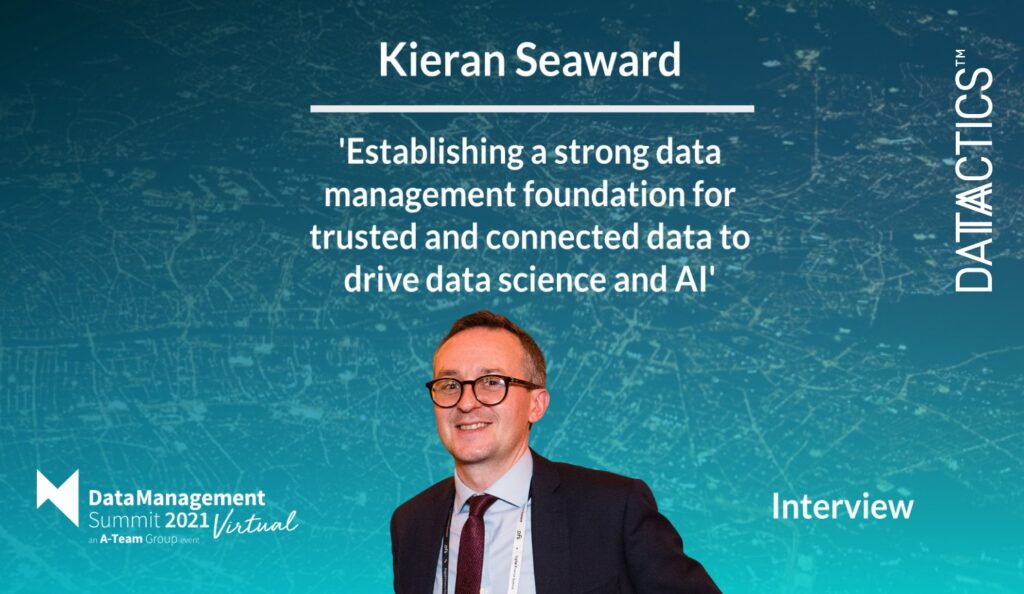
Yesterday, 28th April, Kieran Seaward, Head of Sales took part in a panel discussion entitled ‘Establishing a strong data management foundation for trusted and connected data to drive science and AI’. He spoke alongside Andrea Smith, BNY Mellon; Stan O’Marra, Invesco US; Malavika Solanki, The Derivatives Service Bureau, and Robert Wallos, West Highland. The panel was then moderated by Niresh Rajah.
The panel gave the contributors the opportunity to explore:
– The role of data lineage and governance in sourcing, mapping, and managing alternative and unstructured data.
– How to apply AI/ML and data discovery tools to help monitor, automate, and discover new data assets, enrich the existing data foundation, connect data silos, manage privacy risk.
– How to ensure high quality and trusted data across the organisation.
– How to pull these disciplines together to drive data science and AI/ML and deliver business results.
We caught up with Kieran about the panel and delved into the critical topics of building confidence in the quality of the data, data management and the challenges of unstructured and alternative data.
To kick off, Kieran, business users are reliant on high quality data in order to generate insights. How can we trust the quality of our data and how are you building confidence in the quality of your data?
A number of our client firms have implemented what we term a ‘Data Quality Firewall’ to ensure the integrity of information at ingestion stage, typically from regional or divisional offices, from external partner providers or from vendors.
Regarding ‘building trust or confidence’, I would say measure it from the bottom up using industry standard dimensions of data quality, and in doing so involve data stewards and subject matter experts from the various business lines for two reasons:
1) They will provide the business context and understanding of the data to help define the rules to measure the data;
2) They will also come along as part of the journey and fully understand the reasons for doing this, making it easier to help them ‘buy-in’ to the process.
Once that accurate measurement is in place, you can provide data stewards and business users with a live picture of the quality of their data via data quality dashboards – again building confidence. You can go one further than just reporting on data and empower these users to remediate / correct the data for which they are responsible.
This all takes time, but it does work in building confidence in the data at all levels of the organisation.
What are the challenges of unstructured and alternative data, and how can they be integrated into data platforms and used beneficially by the business?
Firms in the alternative investment space such as Private Equity and Hedge Funds absolutely rely on alternative data as the basis of some of their research. They need to enrich their standardised internal data with alternative data sources. As an example – getting an accurate picture of unlisted firms by utilising company registration office data, such as UK Companies House, or vendor sources such as Pitchbook / Crunchbase. No common identifier exists so you have to map or match that data by different means. This is still proving a major challenge for these firms. In our experience, a centralised approach to standardisation rather than Data Scientists in different areas of the business doing their own thing enables / ensures a harmonised view across the enterprise.
Of course, the accuracy of alternative or unstructured data can be questionable. Anyone who has worked with UK Companies House data will testify to that! However, the benefits of the insights you can generate from these sources is worth overcoming the technical and reliability challenges associated with integrating them with your internal data / systems. Unified, connected, harmonised data is the panacea.
To have further conversations about building confidence in the quality of your data and understanding fully the challenges of unstructured and alternative data, reach out to Kieran Seaward, Head of Sales. If you wish to find out more about how Datactics is using Artificial Intelligence to achieve faster and more accurate analytics, you can reach out directly to Dr Fiona Browne, Head of Artificial Intelligence.
Click here for more on Data Management, or find us on Linkedin, Twitter or Facebook for the latest news from Datactics.

